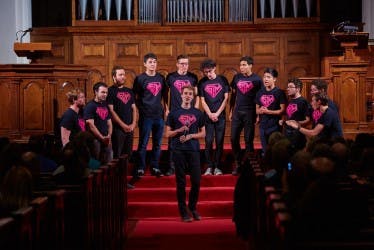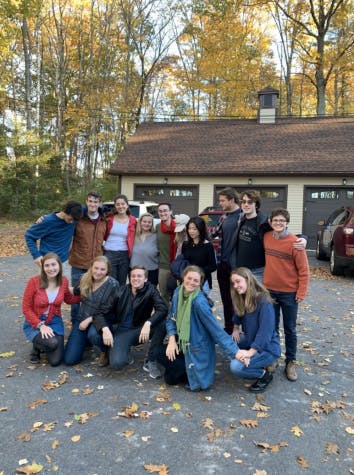With sufficient precautions, the college’s choir and a cappella groups are determined to find a way to continue the experience of ensemble singing. To restore some sense of normalcy, music groups are adopting precautionary measures while simultaneously trying to preserve their normal routines.
The college choir is holding in-person auditions and rehearsals this semester. As a preventative measure, the group uses a microphone network to accomodate in-person rehearsals.
Holding in-person events requires an immense amount of planning and preparation. Over the summer, Professor of Music and Choir Director Jeff Buettner consulted colleagues across the country, read the latest scientific studies and weighed the risks before coming up with an in-person plan.
Singing carries a higher concentration of aerosols than ordinary conversation, so simply standing six feet apart, even if masked, isn’t enough.
“We want to err on the side of safety,” Buettner said. The eight to 10 singers in each 45-minute staggered rehearsal slot are masked and at least 15 feet apart. This separation, while necessary, poses an acoustic challenge in a space as resonant as Mead Chapel, where the group rehearses.
Keeping a group’s tempo consistent and clear at that distance requires a creative solution. “My hypothesis is that a modest headphone system can help capture some of that clarity,” said Buettner. Each singer uses their own earbuds to connect to a network of microphones placed around the chapel, which improves cohesion.
Still, expectations are different this year. The group’s repertoire needs to be rhythmically simpler, and learning music will take far longer. The focus is on simply being able to come together and sing. “We’re actually doing something, working on vocal art,” Buettner said.
To capture the social aspects of being in an ensemble outside of singing together, the choir is also employing Zoom to meet for meals, homework and more.
A Cappella groups get creative
Auditions for a cappella groups have been delayed until later in Phase Two.

“We want to get this going as soon as it's safe to, but [we] are closely monitoring conditions and restrictions to keep everyone involved safe and following guidelines,” said Torre Davy ’21, the president of Stuck In The Middle, an all-male a cappella group at the college.
The uncertainty of auditions has been frustrating. Going through the Student Activities Office for official event approval can take several weeks. Even with student coordinator’s support, preparing a proposal is difficult without concrete details about permissible spaces, group sizes and more.
“The onus has fallen on us to figure it out,” says Bair Lambert ’21, music director of the Mamajamas, a gender-inclusive a cappella group.
A cappella groups are trying to coordinate their auditions so that singers can audition for multiple groups. One option, proposed by the Dissipated Eight group, would include an outdoor, in-person audition.
“That part would be blanket scales and pitch match first,” says Cassandra Wong ’22, musical director of the Mischords. Other possibilities include a Zoom audition or setting up a camera in a designated audition space, with leaders of different groups tuning in to evaluate. Auditioners might also send in a recorded video of their solos.
“When we take new members, we all have to unanimously agree,” Mischords co-leader Annabella Twomey ’21 says. Being able to share video with all members would help to preserve that process while following appropriate guidelines. However, others worry that giving singers the opportunity to submit a video will remove some of the integrity of the experience.

“Auditions are a one-take scenario. Part of the process is rolling with it,” Rachel Rose ’21 from the Mamajamas says. A video gives the auditioner the opportunity to do multiple takes, which removes that organic interaction.
If planning auditions wasn’t difficult enough, rehearsals, too, must be dramatically altered.
“Looking ahead, I could see sectional rehearsals and then a person or two from each section meeting to work on group sound,” Davy said. Stuck in the Middle will continue working with MuseScore and other tools that they’ve previously used to individualize some aspects of rehearsal.
However, nobody plans to sing in isolation. Small rehearsals consisting of one person per part, supplemented by sectionals, are a popular option. With no performance plans in the near future, groups are simply focusing on the positives: being together and having the chance to fine-tune their musical skills.
“This is like our version of sports still practicing,” Lambert said.
Ideally, rehearsals will be held outdoors as long as possible. Eventually, they may move indoors to spaces where appropriate distancing of at least 10 feet is possible. Spaces could include Wilson Hall or certain performance rooms in the Mahaney Arts Center.
Outside of singing, all a cappella groups plan to check in with each other. As small, tight-knit groups, members highly value their sense of community and closeness. As the college enters Phase Two, groups are planning dinners, Zoom sessions and bonding activities like apple picking.
“Beyond an a cappella group, the Mischords are a community of very supportive women,” said Wong. “We’ll definitely find ways to gather safely.”

Olivia Mueller '24 (she/her) is a News Editor.
Previously an Arts and Culture editor, Olivia is an International Politics and Economics major with a Spanish minor. Outside of the Campus, she is a spin instructor for YouPower, an avid runner and hiker, and a member of the Middlebury Mischords a cappella group.




